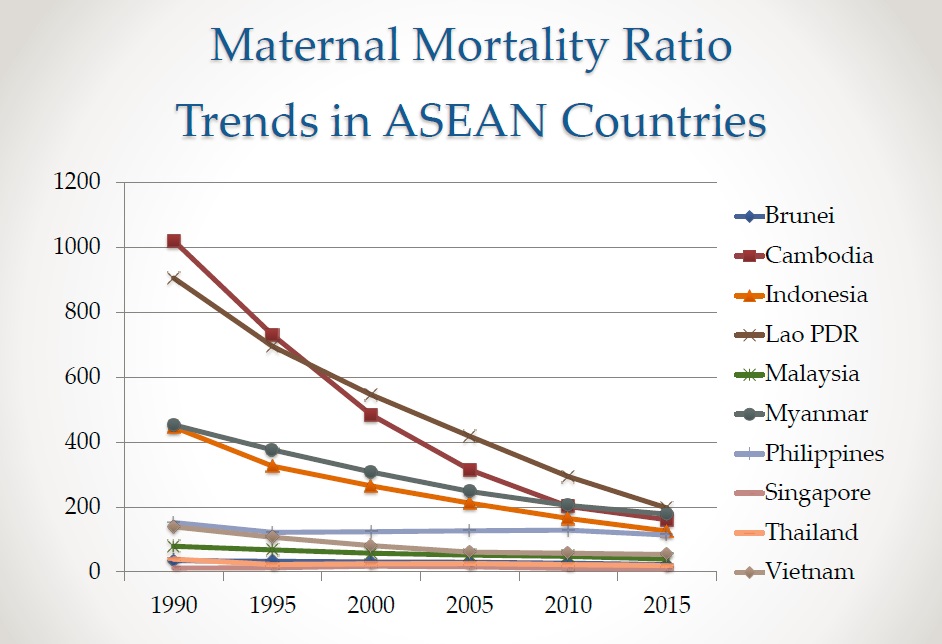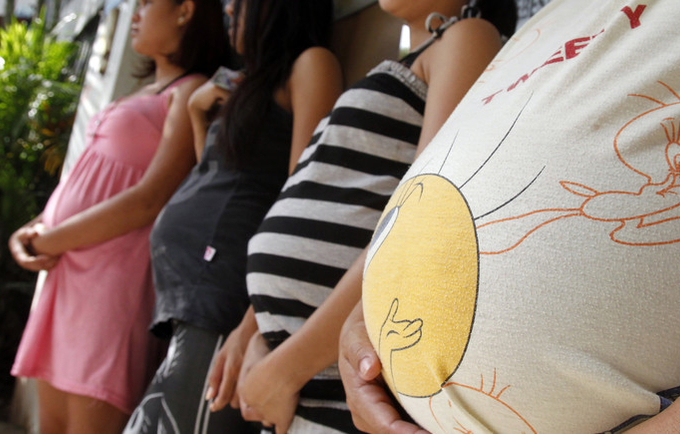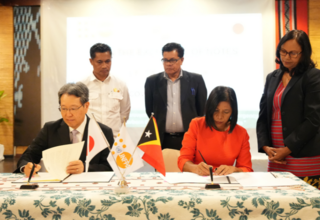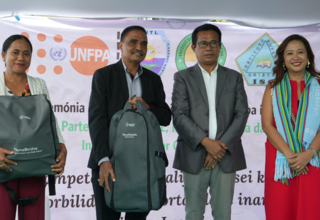"And to muster that will, let us remember that the mother from an ethnic minority who died from bleeding in childbirth because she could not reach a clinic in time, the teenage girl in an urban slum who had to drop out of school because her pregnancy started to show, the gay young man who contracted HIV from ignorance about the virus and a lack of access to protection - they are like us."-Yoriko Yasukawa, Regional Director for Asia and the Pacific, the United Nations Population Fund (UNFPA)
As a Japanese citizen, I read with great interest the speech US President Barack Obama gave during his recent historic visit to Hiroshima, and one sentence struck me like no other: "Those who died, they are like us."
With these few simple words, he quietly called on people around the world to exercise their empathy to bridge the distance, however great, in time and space, to see those 200,000 people killed by the atomic bombs in Japan - indeed all those we see as "others" - as fellow human beings.
The 2030 Agenda for Sustainable Development, recently adopted by the member states of the United Nations, echoes this challenge by calling on nations to overcome inequalities and exclusions to ensure a life of dignity for all people, leaving no one behind. The United Nations Population Fund, where I serve as the Regional Director for Asia and the Pacific, seeks to contribute to this objective by helping countries to achieve universal access to sexual and reproductive health.

A life of dignity
Given our mandate, we are happy to see that the World Economic Forum on ASEAN 2016 is focusing on how to achieve economic integration with social inclusion, and particularly universal health coverage. Because without all people having access to good healthcare that includes sexual and reproductive health services, it is impossible to achieve that goal of a life of dignity for all human beings.
Sexual and reproductive health, at heart, has to do with ensuring that people can enjoy that most intimate and delicate part of our lives - how and with whom we share our bodies and our hearts, and whether and when to have children - in safety and in freedom. It includes, among other services, the provision of family planning methods and counseling and skilled professional assistance when women give birth.
Whether women have access to good sexual and reproductive health services is a matter of life and death. Every year, close to 13,000 women die of causes related to pregnancy and childbirth in the ASEAN region. We estimate that a quarter of those deaths can be prevented if women are provided with effective contraceptive methods. Almost half are a result of
women not having proper care before, during and after giving birth.

Inequality of care
One way to save women's lives is by ensuring access to skilled birth attendance. This varies widely within the ASEAN region, from 41.5% in Lao PDR to 100% in Brunei Darussalam.
Another measure is the rate of utilization of modern family planning methods. Here too, the levels vary greatly within ASEAN: from about 46% in Myanmar to close to 80% in Thailand. Within the same country as well, there are large inequalities - between women living in rural areas and those living in cities, between ethnic majorities and minorities and between the poor and the rich.
To eliminate these inequities and ensure that all people have access to sexual and reproductive health, countries must invest more in these services to provide sufficient and properly trained health professionals, adequate infrastructure for them to work in, and also essential equipment and medicines.
On average, the ASEAN countries spend 4% of their GDP on health, which contrasts with the 12% average of OECD countries. Of course, OECD countries are wealthier than ASEAN nations - but this is about countries placing the greatest possible priority on health in using the wealth that is available to them. And on this front, most ASEAN countries can and must do more. Thailand, for example, started its journey towards universal health coverage almost four decades ago when its GDP per capita was only $400.
And finally, to ensure that universal health coverage is truly universal, countries must take those services to those communities and people who have so far been excluded - the rural poor, ethnic and religious minorities, the disabled, migrants and refugees, the LGBT community.
This is not an easy endeavor, but we at UNFPA are confident that with strong and sustained political will, the ASEAN region can achieve the goal of universal health coverage and universal access to sexual and reproductive health by 2030. And to muster that will, let us remember that the mother from an ethnic minority who died from bleeding in childbirth because she could not reach a clinic in time, the teenage girl in an urban slum who had to drop out of school because her pregnancy started to show, the gay young man who contracted HIV from ignorance about the virus and a lack of access to protection - they are like us.
This article is written by Yoriko Yasukawa, Regional Director for Asia and the Pacific, the United Nations Population Fund (UNFPA) in the occasion of World Economic Forum in Kuala Lumpur, June 1-2. This article is just published in World Economic Forum blog at https://www.weforum.org/agenda/2016/05/sexual-health-in-east-asia-its-a-matter-of-life-and-death
Tetum Version
"No atu realiza mehi ida ne'e, mai ita hotu hanoin fali inan ida husi etniku minoridade ne'ebé maka mate tamba deit ran fakar durante partus tamba nia labele ba to'o iha klinika ho tempo lolos, jovem feto ida iha urbana ne'ebé maka sai husi eskola tamba ninia isin-rua ema komesa nota, ema jovem gay (panleru/maufeto) ne'ebé maka hetan virus HIV tamba deit la hatene kona-ba virus no menus asesu ba proteksaun - sira ne'e hanesan mos ita." Yoriko Yasukawa, Direitor Rejional ba Asia no Pasifiku, Fundus Nasoens Unidas ba Populasaun (UNFPA)

Hanesan sidadaun Japoneza ida, Hau lee ho interese makaas ba diskursu husi Prezidente EUA Barack Obama durante ninia vizita historiku ba Hiroshima, Japaun, no liafuan ida nebe halo hau preokupa tebes maka: " Sira ne'ebé mate, sira moos hanesan ita."
Ho liafuan simplez hirak ne'e, nia ho neneik bolu atensaun ba ema hotu iha mundu atu ezersa sira nia sentimentu empatia atu liga distansia, alende boot, iha tempu no spasu, atu hare ema rihun 200,000 ne'ebé mate tamba bomba atom iha Japan - nunee mos hirak ne'ebé maka ita hare hanesan "ema seluk" - hanesan humana ida.
Agenda Metas Dezenvolvimentu Sustentabel 2030, foin lalais adopta husi membru estadu Nasoens Unidas, ne'ebé elabora mos obstaklu ida nee liu husi bolu atensaun ba nasaun sira atu hasai tiha dezigualidade no exkluzaun atu asegura moris ho dignidade ba ema hotu, la husik ema ida iha kotuk. Fundus Nasoens Unidas ba Populasaun, iha ne'ebé maka hau servisu ba nudar Direitor Rejional ba Asia no Pasifiku, buka atu kontribui ba objektivu ida ne'e liu husi ajuda nasaun sira atu atinji asesu universal ba saúde seksual no reproduktiva.

Moris ida ho dignidade
Tuir ami nia mandatu, ami kontente atu hare katak Forum Ekonomia Mundial kona-ba ASEAN 2016 sei foka ba oinsa atu atinji integrasaun ekonomia ho inkluzaun sosial, no partikularmente asesu universal ba saúde. Tamba se ema hotu la asesu ba kuidadus saúde ne'ebé maka diak,inklui servisu saúde seksual no reproduktiva, imposibel atu atinji metas ida moris ho dignidade ba ema hotu.
Saúde seksual no reprodutiva, sai sentru, atu halo hodi asegura katak ema hotu bele goza parte husi ita nia moris ne'ebé maka intimadu no delikadu -oinsa ho see ita fahe ita nia isin-lolon no ita nia fuan, no iha ne'ebé no bainhira hakarak iha oan - ho seguru no livre. Ida ne'e mos inklui, husi servisu sira seluk, provizaun ba metodu planeamentu familiar no akonsellamentu no ajuda husi profesional saúde bainhira feto sira partus.
Karik feto sira iha asesu ba servisu saúde seksual no reprodutiva ho kualidade nudar kestaun moris no mate nian. Kada tinan, feto besik 13,000 maka mate tamba kauza relasiona ho isin-rua no partus iha rejiaun . Ami nia estimasaun katak um tersu ou ida husi nain-tolu nebe maka mate ne'e bele prevene karik feto sira hetan metodu kontraseptivu hirak ne'ebé efetivu. Besik metade maka rezulta husi feto sira la hetan kuidadus ho lolos antes, durante no depois partus.

Kuidadus ne'ebé maka la hanesan
Dalan ida atu salva feto sira nia moris maka liu husi garantia asesu ba pesoal saúde ne'ebé treinadu. Ida ne'e diferente entre rejiaun ASEAN, husi pursentu 41.5 iha Lao PDR to'o pursentu 100 iha Brunei Darussalam.
Sasukat seluk maka rasio ba utilizasaun metodu planeamentu familiar modernu. Hanesan mos, iha diferensa entre nasaun ASEAN: husi pursentu 46 iha Myanmar to'o besik pursentu 80 iha Thailand. Iha nasaun hirak ne'ebé hanesan, iha mos dezigualidade boot ˗ entre feto sira ne'ebé maka moris iha rurais no hirak ne'ebé maka moris iha urbana, entre etniku maioria no minoria no entre kiak no riku.
Atu hapara dezigualidade hirak ne'e no asegura katak ema hotu iha asesu ba saúde seksual no reproduktiva, nasaun sira tenki investe barak liu iha servisu hirak ne'ebé atu fornese pesoal saúde profesional ne'ebé natoon no treinadu, infrastruktura ne'ebé diak ba sira atu halo servisu, no nunee mos ekipamentu no aimoruk esensial sira.
Iha nivel mediu, nasaun hirak iha ASEAN gastus pursentu 4 husi sira nia GDP ba saúde, iha ne'ebé kontrariu ho pursentu mediu 12 husi nasaun OECD sira ne'ebé maka diak liu duke nasaun ASEAN sira - maibe ida ne'e kestaun nasaun hirak ne'e tau prioridade posibel ba saúde bainhira uza sira nia riku osin ne'ebé maka iha. No iha ne'e, maioria nasaun ASEAN sira bele no tenki halo buat barak. Ezemplu, nasaun Thailand, hahu sira nia viajem atu to'o ba asesu saúde universal besik dekada haat liu ba bainhira sira nia GDP iha deit $400.
No ikus liu, atu garantia katak kobertura saúde universal sai universal duni, maka nasaun sira tenki foti servisu hirak ne'e ba komunidade sira no ema hirak ne'ebé maka seidauk hola parte ba - kiak sira husi rural, etniku no relijiaun minoria, ema ne'ebé ho nesesidade spesial, migrante sira no refujiadus sira, no komunidade LGBT.
Ida ne'e laos buat ne'ebé fasil, maibe ami iha UNFPA ho fiar aan katak ho politika ne'ebé forte no sustentabel, rejiaun ASEAN bele atinji kobertura metas saúde universal no asesu universal ba saúde seksual no reproduktiva iha tinan 2030. No atu realiza mehi ida ne'e, mai ita hotu hanoin fali inan ida husi etniku minoridade ne'ebé maka mate tamba deit ran fakar durante partus tamba nia labele ba to'o iha klinika ho tempo lolos, jovem feto ida iha urbana ne'ebé maka sai husi eskola tamba ninia isin-rua ema komesa nota, ema jovem gay (panleru/maufeto) ne'ebé maka hetan virus HIV tamba deit la hatene kona-ba virus no menus asesu ba proteksaun - sira ne'e hanesan mos ita.
Artigu ida ne'e hakerek husi Yoriko Yasukawa, Direitor Rejional ba Asia no Pasifiku, Fundus Nasoens Unidas ba Populasaun (UNFPA) relasiona ho Forum Ekonomia Mundial iha Kuala Lumpur, 1-2 Junhu 2016. Artigu ida ne'e foin publika moos iha pagina Forum Economia Mundial iha https://www.weforum.org/agenda/2016/05/sexual-health-in-east-asia-its-a-matter-of-life-and-death



